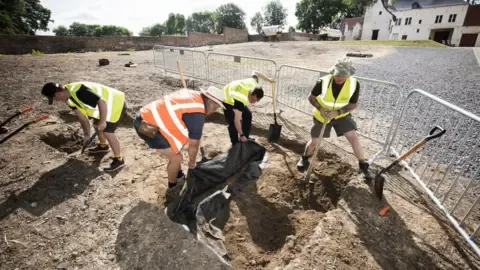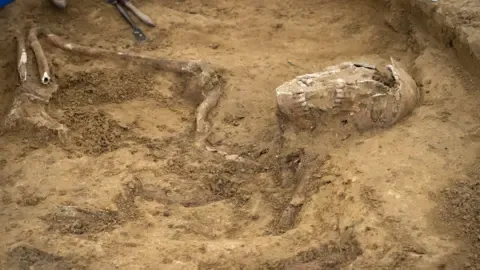Archaeologists and historians are eager to uncover the secrets of the Battle of Waterloo, which took place in 1815. A recent excavation at the site of a former field hospital at Mont-Saint-Jean farm in Belgium has already yielded some remarkable discoveries. In 2022, an archaeological team, led by the veteran support charity Waterloo Uncovered, uncovered the remains of 20 horses that had been executed and buried alongside human skeletons. This discovery was hailed as “a highly unusual and historically significant occurrence” by archaeologists.
The excavation also revealed the amputated limbs of wounded soldiers and the skeletons of three horses. Historical evidence suggests that many of the skeletons found on the battlefield were dug up and turned into fertiliser or used in the production of sugar. This gruesome fate highlights the brutal realities of war and the aftermath of the Battle of Waterloo.
Professor Tony Pollard of the University of Glasgow, the archaeological director of the project, described the site as “incredibly exciting” due to the presence of amputated limbs, complete human burials, and remains of euthanised horses all found in one trench. He noted that the discovery of horses and humans buried alongside each other, with evidence of care and separation, is extremely rare.
The excavation is set to continue from September 3rd to 13th, with an international team of military veterans, serving personnel, archaeologists, and volunteers working together to uncover the secrets of the battlefield. According to Abigail Boyle, CEO of Waterloo Uncovered, the charity’s goal is to support veterans in their recovery and transition into civilian life by providing them with key transferable archaeological skills.

Excavation Uncovers Secrets of Waterloo Battlefield (Image via Getty)
These skills will not only provide pathways into education, employment, or hobbies but also give veterans a sense of purpose and fulfillment. Even professional archaeologists rarely get to work on a site of this calibre, making it a once-in-a-lifetime opportunity.
The Battle of Waterloo was a pivotal moment in history, marking the end of Napoleon’s reign and the beginning of a new era. The excavation at Mont-Saint-Jean farm is an effort to uncover the stories of the men who fought and died on the battlefield, as well as the bravery and resilience of those who survived.
The farm, which has been converted into a brewery, brasserie, and museum, has been a hub of activity since its rescue in 2014. Anthony Martin, the farm’s owner, is delighted to welcome Waterloo Uncovered back to the site, believing that the excavation will uncover even more of the site’s history while supporting modern-day veterans.
The Battle of Waterloo was led by the British army, led by Arthur Wellesley, 1st Duke of Wellington, who was also a Conservative prime minister. The conflict resulted in the deaths of over 47,000 soldiers and civilians, and its legacy continues to shape modern history. The excavation at Mont-Saint-Jean farm is an important step in preserving the history of the Battle of Waterloo and telling the stories of those who fought on the battlefield.


























